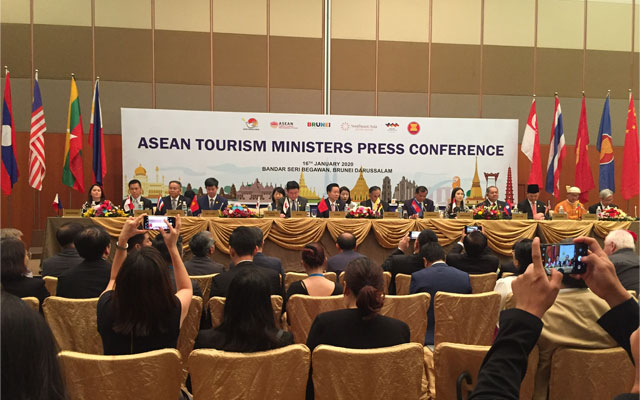
The growing emphasis on eco-tourism as well as sustainable and inclusive tourism development, were spotlighted at the ASEAN Tourism Forum (ATF) ministers’ press conference held on yesterday in Brunei Darussalam, in conjunction with ATF 2020.
Aside from the 10 ASEAN tourism representatives, China, Japan and Republic of Korea’s tourism ministers were also in attendance.

During the conference, it was noted that despite the current global economic slowdown, it has not taken a huge toll on tourism in South-east Asia. The region welcomed 133.1 million tourists in 2019, a seven per cent increase from the previous year, according to preliminary submissions by ASEAN member states.
Notably, intra-ASEAN travel continued to contribute the major share of tourists, making up 36.7 per cent of total international arrivals in 2018, according to a joint media statement at the 23rd meeting of ASEAN tourism ministers.
Speaking through a translator, Xu Zhang, vice minister of culture and tourism, China, said: “On the backdrop of this sluggish (global) economic development, regional tourism may flourish in Asia in the future. Travel with shorter distance and less time would be more popular among tourists. As such, the Chinese government is now composing a strategic plan to promote regional tourism in Asia.”
“We also want to enhance our tourism capacity, in terms of quality and engagement of participants, and create more jobs in the industry.”
As well, ministers who attended the conference also placed a strong emphasis on growing their countries’ eco-tourism offerings.
“We are making eco-tourism our main product, where tourists are encouraged to go to rainforests – not to destroy but to preserve them. In fact, we don’t use the term eco-tourism anymore, but ‘responsible, sustainable and inclusive tourism’,” said Ali Apong, minister of primary resources and tourism, Brunei.
Citing the rehabilitation of major tourist destinations in the Philippines in recent years, the country’s tourism secretary Bernadette Romulo-Puyat stressed that it’s not just up to the national governments, but also industry stakeholders, to promote sustainable tourism.
“We also have to be mindful of the need to balance economic development with saving the environment. If we don’t save our environment, then we will no longer have our tourist destinations (in the future),” she said.
During the conference, when asked about the focus for 2020, Singapore Tourism Board’s chief executive Keith Tan revealed the Lion City has plans to grow its health and wellness tourism offerings to enhance the country’s attractiveness as a tourist destination.
“We are looking beyond medical tourism. We want to pursue a broader ambit of wellness tourism, beyond hospitals, clinics and surgeries. There are a whole host of other health and wellness offerings that people are now seeking out. So our focus is on making Singapore attractive for people who are pursuing health and wellness options outside a hospital setting.
“We believe that it is a very big growth area in Asia as people will be willing to spend more on skincare, haircare, anti-ageing in the future. (We also have plans to hold) health and wellness events, for example, international yoga or pilates events, where we get wellness instructors to lead wellness festivals in Singapore,” shared Tan.



















